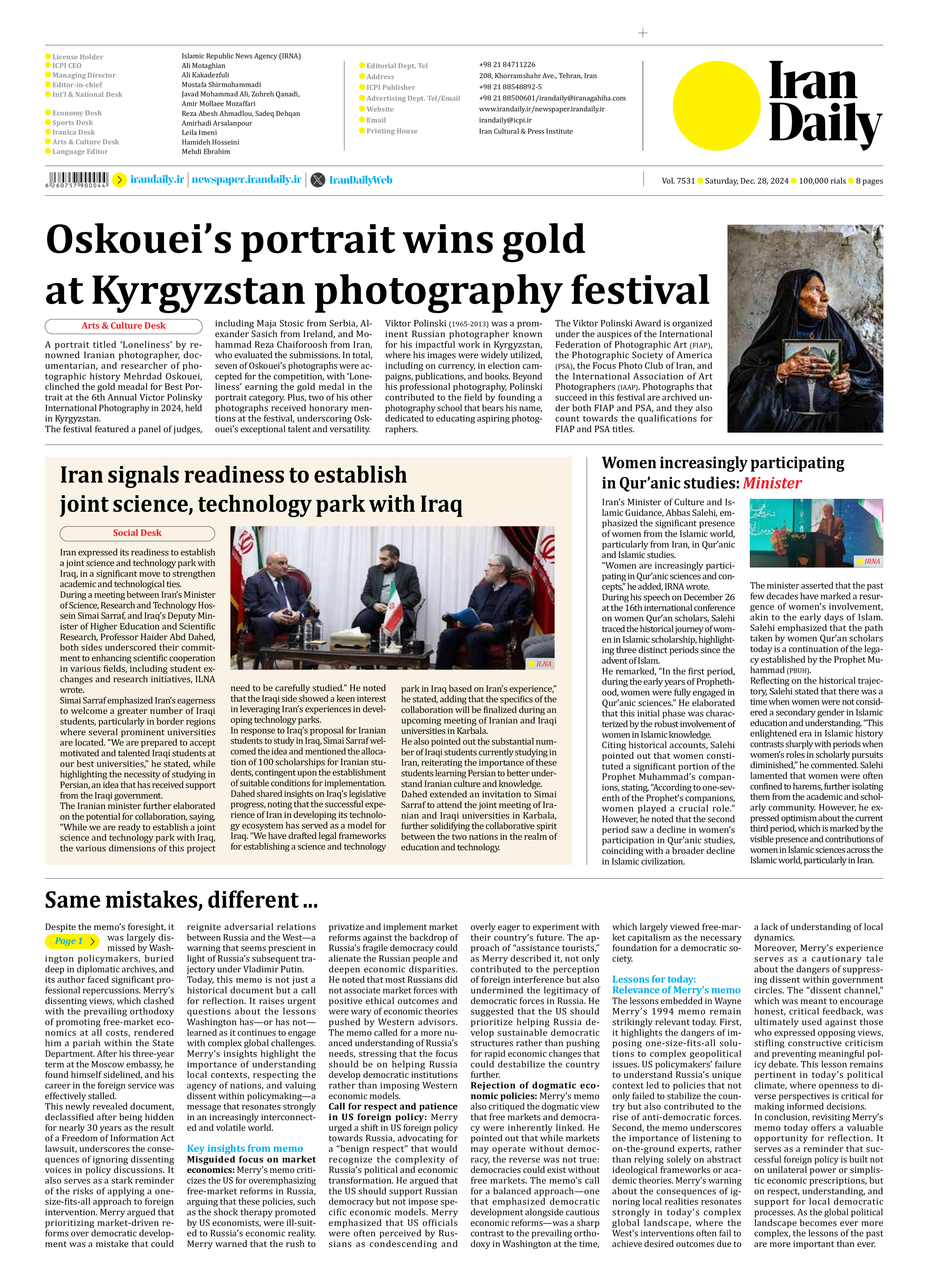
Same mistakes, different ...
Page 1
Despite the memo’s foresight, it was largely dismissed by Washington policymakers, buried deep in diplomatic archives, and its author faced significant professional repercussions. Merry’s dissenting views, which clashed with the prevailing orthodoxy of promoting free-market economics at all costs, rendered him a pariah within the State Department. After his three-year term at the Moscow embassy, he found himself sidelined, and his career in the foreign service was effectively stalled.
This newly revealed document, declassified after being hidden for nearly 30 years as the result of a Freedom of Information Act lawsuit, underscores the consequences of ignoring dissenting voices in policy discussions. It also serves as a stark reminder of the risks of applying a one-size-fits-all approach to foreign intervention. Merry argued that prioritizing market-driven reforms over democratic development was a mistake that could reignite adversarial relations between Russia and the West—a warning that seems prescient in light of Russia’s subsequent trajectory under Vladimir Putin.
Today, this memo is not just a historical document but a call for reflection. It raises urgent questions about the lessons Washington has—or has not—learned as it continues to engage with complex global challenges. Merry’s insights highlight the importance of understanding local contexts, respecting the agency of nations, and valuing dissent within policymaking—a message that resonates strongly in an increasingly interconnected and volatile world.
Key insights from memo
Misguided focus on market economics: Merry’s memo criticizes the US for overemphasizing free-market reforms in Russia, arguing that these policies, such as the shock therapy promoted by US economists, were ill-suited to Russia’s economic reality. Merry warned that the rush to privatize and implement market reforms against the backdrop of Russia’s fragile democracy could alienate the Russian people and deepen economic disparities. He noted that most Russians did not associate market forces with positive ethical outcomes and were wary of economic theories pushed by Western advisors. The memo called for a more nuanced understanding of Russia’s needs, stressing that the focus should be on helping Russia develop democratic institutions rather than imposing Western economic models.
Call for respect and patience in US foreign policy: Merry urged a shift in US foreign policy towards Russia, advocating for a “benign respect” that would recognize the complexity of Russia’s political and economic transformation. He argued that the US should support Russian democracy but not impose specific economic models. Merry emphasized that US officials were often perceived by Russians as condescending and overly eager to experiment with their country’s future. The approach of “assistance tourists,” as Merry described it, not only contributed to the perception of foreign interference but also undermined the legitimacy of democratic forces in Russia. He suggested that the US should prioritize helping Russia develop sustainable democratic structures rather than pushing for rapid economic changes that could destabilize the country further.
Rejection of dogmatic economic policies: Merry’s memo also critiqued the dogmatic view that free markets and democracy were inherently linked. He pointed out that while markets may operate without democracy, the reverse was not true: democracies could exist without free markets. The memo’s call for a balanced approach—one that emphasized democratic development alongside cautious economic reforms—was a sharp contrast to the prevailing orthodoxy in Washington at the time, which largely viewed free-market capitalism as the necessary foundation for a democratic society.
Lessons for today: Relevance of Merry’s memo
The lessons embedded in Wayne Merry’s 1994 memo remain strikingly relevant today. First, it highlights the dangers of imposing one-size-fits-all solutions to complex geopolitical issues. US policymakers’ failure to understand Russia’s unique context led to policies that not only failed to stabilize the country but also contributed to the rise of anti-democratic forces. Second, the memo underscores the importance of listening to on-the-ground experts, rather than relying solely on abstract ideological frameworks or academic theories. Merry’s warning about the consequences of ignoring local realities resonates strongly in today’s complex global landscape, where the West’s interventions often fail to achieve desired outcomes due to a lack of understanding of local dynamics.
Moreover, Merry’s experience serves as a cautionary tale about the dangers of suppressing dissent within government circles. The “dissent channel,” which was meant to encourage honest, critical feedback, was ultimately used against those who expressed opposing views, stifling constructive criticism and preventing meaningful policy debate. This lesson remains pertinent in today’s political climate, where openness to diverse perspectives is critical for making informed decisions.
In conclusion, revisiting Merry’s memo today offers a valuable opportunity for reflection. It serves as a reminder that successful foreign policy is built not on unilateral power or simplistic economic prescriptions, but on respect, understanding, and support for local democratic processes. As the global political landscape becomes ever more complex, the lessons of the past are more important than ever.







